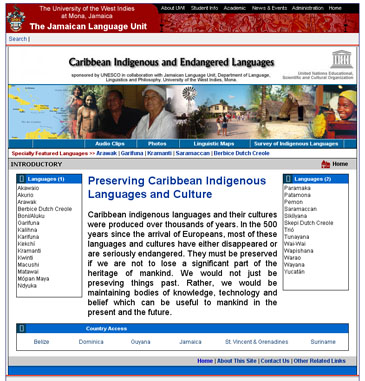UNESCO supports Caribbean indigenous and endangered languages portal
07-11-2006 (Kingston)

UNESCO and University of West Indies Language Unit launch the first authoritative website on Caribbean Indigenous and Endangered Languages (CIEL). The website showcases and promotes the preservation of over 20 indigenous languages in the region.
Caribbean indigenous languages and their cultures were produced over thousands of years. In the 500 years since the arrival of Europeans, most of these languages and cultures have either disappeared or are seriously endangered.
According to Hubert Devonish, Professor of Languages at the University of the West Indies, “these languages must be preserved if we are to safeguard a significant part of the heritage of mankind. We would not just be preserving things past but rather, we would be maintaining bodies of knowledge, technology and beliefs which can be useful to mankind in the present and the future.”
Hubert Devonish insists on and ensures that his team employs scientific approaches in the collection of data relating to these indigenous languages, making the portal truly authoritative.
UNESCO is now exploring Phase 2 of the project along the lines of:
a) additional language data collection;
b) language documentation through the production and digital storage of the material collected;
c) development of webpages within the CIEL website especially designed for use by school children and members of the communities involved;
d) production of books of stories and cultural information bilingually, in indigenous languages and English, supported by audio and video materials.
According to Hubert Devonish, Professor of Languages at the University of the West Indies, “these languages must be preserved if we are to safeguard a significant part of the heritage of mankind. We would not just be preserving things past but rather, we would be maintaining bodies of knowledge, technology and beliefs which can be useful to mankind in the present and the future.”
Hubert Devonish insists on and ensures that his team employs scientific approaches in the collection of data relating to these indigenous languages, making the portal truly authoritative.
UNESCO is now exploring Phase 2 of the project along the lines of:
a) additional language data collection;
b) language documentation through the production and digital storage of the material collected;
c) development of webpages within the CIEL website especially designed for use by school children and members of the communities involved;
d) production of books of stories and cultural information bilingually, in indigenous languages and English, supported by audio and video materials.

Related themes/countries
· Latin America/Caribbean
· Indigenous People and Information Society
· Multilingualism in Cyberspace: News Archives 2006
· Languages in Cyberspace
Share this story:
Contact information
- UNESCO
Source
- UNESCO Office for the Caribbean
Field office














